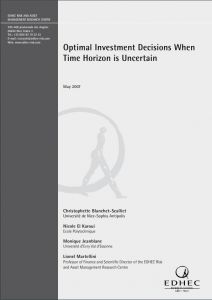

Optimal Investment Decisions When Time Horizon is Uncertain
Many investors do not know with certainty when their portfolio will be liquidated. Should their portfolio selection be influenced by the uncertainty of exit time? In order to answer this question, we consider a suitable extension of the familiar optimal investment problem of Merton (1971), where we allow the conditional distribution function of an agent’s time horizon to be stochastic and correlated to returns on risky securities. In contrast to existing literature, which has focused on an independent time horizon, we show that the portfolio decision is affected. A revisited version of this paper was published in the December 2008 issue of the Journal of Mathematical Economics.
Author(s):
Summary:
Many investors do not know with certainty when their portfolio will be liquidated. Should their portfolio selection be influenced by the uncertainty of exit time? In order to answer this question, we consider a suitable extension of the familiar optimal investment problem of Merton (1971), where we allow the conditional distribution function of an agent’s time horizon to be stochastic and correlated to returns on risky securities. In contrast to existing literature, which has focused on an independent time horizon, we show that the portfolio decision is affected. A revisited version of this paper was published in the December 2008 issue of the Journal of Mathematical Economics.
Register to download PDF
Register/Log in| Type : | Working paper |
|---|---|
| Date : | 05/07/2007 |
| Keywords : |
Asset Allocation |

